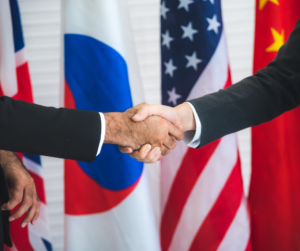
Policy-Making: The Key to Improving Intergovernmental Collaboration
The only way we will effectively address the biggest issues facing humanity and the planet itself is if we work together as a global community to solve these problems. Setting aside national interests in favour of solving the greater challenges facing our shared home, Earth, is imperative.
The first step is to improve intergovernmental collaboration. This may seem daunting or even impossible in today’s complex and often polarized world, but it doesn’t have to be. Despite seemingly impassable differences in structure and operation, governments around the world share one key commonality: they all use a policy-making process to inform their key decisions. Make no mistake about it, today’s public policies are setting the stage for the world our children and grandchildren will inherit.
In this post, we’ll explore the gravity of the issues facing our global village, the nationhood paradox that is impeding intergovernmental collaboration, and the game-changing opportunities offered by a policy-making process rooted in best practices.
The Age of Humans

There can no longer be any doubt that we live in a global village.
There are more goods, services, people, money and information moving across government borders than at any time in human history.
No government alone has the power to regulate all of this activity or the consequences of this activity. Much of it is therefore under-regulated, differently regulated, or not regulated at all. With 195 nations and countless sub-national governments trying to oversee the activities under their jurisdiction, efforts to manage human activity in this manner is very ineffective.
Further, in our global village, the consequences of the actions of individuals, corporations and governments are felt far beyond individual government jurisdictions. The disruptive power of humanity as a collective is so immense that many scientists are calling this epoch the Anthropocene or the “Age of Humans”.
Collective human activity has caused, amongst other things:
- war and conflict among nations and peoples;
- climate change and other earth system disruptions;
- the extinction of species at an alarming rate;
- inequitable access to basic necessities and human rights; and,
- the propagation of hate and discrimination.
No government acting alone can address the collective negative consequences of human activity.

The United Nations Model
While there are some examples of successful collaboration across international borders, such as the aviation and banking industries, most human activity is not as effectively regulated as it can be!
The United Nations and other international organizations cannot solve many of the global challenges for one simple reason: their member nations put their own interests first.
In our relatively new global village, this is the nationhood paradox. By putting the health and welfare of their citizens first, nations jeopardize the health and welfare of all global citizens, including their own, and of the planet upon which all of us rely.
Consider the example of climate change, one of the most pressing issues facing humanity today. The global community, via the United Nations, are attempting to resolve it by convening regular Conference of Parties (COP) meetings where they agree on commitments and actions that governments can take collectively to address the issue.
Today, more than 20 years after the Rio Earth Summit, global greenhouse gas emissions are still increasing. Governments have not even pledged sufficient reductions to achieve the goal of limiting global temperature rise to 1.5 degrees Celsius by 2030, let alone taken substantive actions to curtail emissions.
The United Nations model cannot, inherently, overcome the nationhood paradox. A much more collaborative approach is required among governments and people to address the reality that we live in a global village. Otherwise, it’s highly unlikely the problems caused by humanity’s collective activity will be solved before the consequences become dire.

A Way Forward: Public Policy-Making
Improving intergovernmental collaboration may seem daunting, or even impossible, when one considers the different government structures in place around the world, including democracy, autocracy, theocracy, monarchy, and communism. Not to mention the deep divisions in opinion and ideology within and among many nations.
Changing the structure of governments and the ways that decision-makers come to power is an extremely difficult, if not impossible, endeavour. Getting nations to agree to a more effective international governance structure is also not a realistic goal at this point in human history.
However, all governments, regardless of size, type, or level, have a policy-making process to inform their decision-makers. In many cases, it is an administrative process that can be changed relatively easily, without structural changes to the government. Governments then can adopt a common, shared process for policy-making with other such governments, which would result in common policy recommendations for their respective policy-makers.

The Civonus Solution
Civonus Inc. has created a web-based policy-making process that multiple governments can use to identify a common set of evidence and advice for consideration by their decision-makers.
Civonus is designed to provide more open, transparent, sustainable, inclusive, equitable, and evidence-informed policymaking. To address the challenge of conflicts in opinion and ideology, Civonus uses a mass consensus-building approach, which encourages participants to consider other perspectives and strive for decisions that all can accept.
The Civonus policy-making process can be used regardless of the government structure or the way the decision-makers came to power. What is important, however, is that governments adopt a common, standardized approach to policy-making and collaborate on decisions across jurisdictional boundaries on common issues.
It is through a new model of policy-making that better public policy and effective collaboration among governments will truly be achieved.

